Paint booth filters
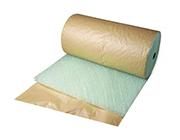
Filters for bodywork paint booths
-
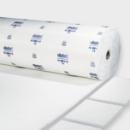 FPLAFMade-to-measure ceiling filter - 600g/m² (2.5 oz/m²)Thickness 22 to 25mm
FPLAFMade-to-measure ceiling filter - 600g/m² (2.5 oz/m²)Thickness 22 to 25mm -
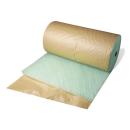 FSOLFiberglass floor filter - 245g/m² (8.5 oz/m²)Thickness 75mm
FSOLFiberglass floor filter - 245g/m² (8.5 oz/m²)Thickness 75mm -
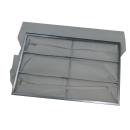 PFCHAMPCHAMPOULET pre-filter820x520x350mm - 3 cells
PFCHAMPCHAMPOULET pre-filter820x520x350mm - 3 cells -
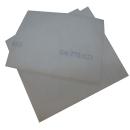 PFG3Made-to-measure G3 pre-filter - 550 g/m².Thickness 20mm
PFG3Made-to-measure G3 pre-filter - 550 g/m².Thickness 20mm -
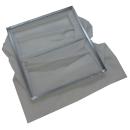 PFOMIAOMIA pre-filter610x520x650mm - 2 cells
PFOMIAOMIA pre-filter610x520x650mm - 2 cells -
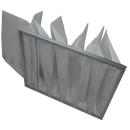 PFWEINMWEINMANN Pre-filter - 5 cells592x592x330mm - metal frame
PFWEINMWEINMANN Pre-filter - 5 cells592x592x330mm - metal frame
︾
Which paint spray booth filters should I choose?
Paint booth filters: an essential part of the bodywork environment
In a car body shop, the quality of the final result depends directly on control of the working environment. The paint booth is designed to provide an enclosed, clean and controlled space, enabling a flawless finish to be achieved on vehicles during paintwork.
At the heart of this system is the paint booth filter, which is essential for ensuring purified air and even application of products.
Paint booth filters give vehicles a perfect finish. Designed for body shops, these filters play an essential role in purifying the air and capturing paint mist. Whether it's the ceiling filter for clean incoming air or the Fiberglass floor filter to trap paint particles, each filter contributes to a controlled and safe environment.
Why use a spray booth filter?
The main role of a Spray booth filter is to retain dust particles, solvents and paint mist so that they do not redeposit on the freshly painted bodywork. This ensures safe, clean working conditions and reduces the risks for the bodybuilder.
There are many advantages to a high-performance filter:
- Quality of finish: no dust or impurities affecting the surface
- Health safety: reduced exposure of painters to solvents and volatile compounds
- Compliance with environmental standards: capture of pollutant particles before air discharge
- Cabin longevity: an effective filtration system also protects the installation's fans and motors.
The different types of body filter:
Several filters can be installed, depending on how the cabin operates:
- Plenum filters: located in the ceiling, they purify the air entering the cabin
- Paint filters: located in the exhaust, they trap paint mist
- Activated carbon filters: used to absorb solvents and limit odours.
When should you replace your paint booth filter?
A clogged filter leads to a drop in performance: deposits on painted surfaces, over-consumption of paint and increased health risks. As a general rule, it is advisable to check the condition of the filter regularly and replace it according to how often the workshop is used.
The filter for car paint spray booths is much more than just a consumable: it's a guarantee of quality, safety and productivity for any bodywork workshop. Choosing the right filter for your booth and replacing it regularly will ensure a perfect finish, protecting both professionals and the environment.
What's the difference between Fiberglass floor filters, ceiling filters and cab protection film?
1. Fiberglass floor filter:
- Installed on the floor or extracted from the booth.
- Captures overspray, i.e. paint particles that do not attach to the bodywork and remain suspended in the air.
- Material: composed of random Fiberglass fibres, forming a progressive structure that traps fine particles
- Advantage: protects the environment by avoiding the discharge of solvents/paints and keeps the cabin clean for longer.
2. Ceiling filter :
- Placed on the ceiling of the booth, before the air is diffused.
- Purifies the air entering the booth by trapping dust and impurities in the ambient air.
- Often made of very fine synthetic fibres with high filtration efficiency (class F5. F6 or higher)
- Ensures a clean, laminar downward flow of air, preventing dust from settling on the bodywork during painting.
3. Cab protection film:
- Applied directly to the inside of the booth (walls, windows, lighting).
- It protects the surfaces of the booth against splashes of paint, dust and dirt.
- Transparent or white adhesive film, sometimes pre-applied for easy replacement
- Keeps walls clean, improves brightness and reduces contamination of painted parts
What are the advantages of a paint booth filter?
1. Optimum finish quality :
- Elimination of airborne dust and impurities
- More even and uniform application of paint
- Reduced defects (dust, drips, orange peel)
2. Protection of painters' health :
- Capture of paint mist and airborne particles
- Reduced exposure to solvents and VOCs (volatile organic compounds)
- Compliance with workshop health and safety standards
3. Respect for the environment:
- Trapping of pollutant particles before air discharge
- Limits harmful emissions outside the cab
- Contributes to a cleaner, more eco-responsible workshop
4. Cabin performance and longevity :
- Protects motors and fans from clogging
- Maintains constant, laminar airflow
- Reduces cab maintenance and cleaning costs
5. Cost savings and productivity :
- Fewer paint touch-ups and reworks
- Reduced consumption of products (paint, Clearcoat, primer)
- Optimised working time thanks to a controlled environment
How long does a paint booth filter last?
The service life of a paint booth filter is not fixed, as it depends on several factors linked to the use of the booth and the type of filter installed.
The average service life depends on the type of filter:
- Ceiling filter: generally 3 to 6 months, depending on how intensively the booth is used.
- Floor filter (Fiberglass): around 1 to 3 months, as it quickly becomes saturated with paint mist.
- Activated carbon filters (against solvents and odours): more variable duration, from 2 to 6 months, depending on the volume of solvents used.
Factors influencing service life :
- Frequency of use of the booth (occasional, daily or intensive)
- Type of paint used (solvent-based or water-based)
- Quality of ventilation and air flow
- Regular maintenance and cleaning of the booth
How do I install a paint filter?
1. Prepare the booth:
- Turn off all fans and filtration systems
- Remove old filters (ceiling, floor or activated carbon) following the manufacturer's instructions
- Lightly clean the areas to remove dust and paint residues.
2. Install the ceiling filter:
- Identify the air flow direction indicated on the filter
- Position the filter in the ceiling frame, often clipped or placed in a groove.
- Make sure the filter is flat and fits snugly, with no gaps at the sides.
3. Install the floor filter :
- Place the filter on the extraction floor of the cabin, usually at the bottom, in front of the extraction fan
- Make sure the filter covers the entire extraction surface to capture the paint mist effectively.
- Some filters are stackable: respect the number of layers recommended by the manufacturer
To sum up, in a bodywork workshop, a paint booth filter is the ideal technical solution for ensuring even spraying and optimum finish quality. Each spray booth must be fitted with suitable filters to meet all your needs: containment of paint mist, protection of the spray gun and equipment, and keeping the booth clean.
Filters, often made of reinforced fibre or rollers, effectively manage the load of particles and solvents. Regular replacement is essential to avoid contamination and guarantee professional results. Consult our catalogue to find out about the different types of filter available and their prices, and follow our advice for quick replacement and optimum maintenance.
A high-performance filter is an essential tool for your workshop: it protects your equipment, makes spray gun work easier, optimises spraying and gives you a flawless finish every time.
How much does a paint booth filter cost?
In a car body shop, the paint booth filter is an essential element in guaranteeing perfect finishes and a healthy working environment. But how much does a paint booth filter really cost, and how can you plan your budget?
The floor filter, which captures paint mist and fine particles to protect the workshop and the environment, generally costs between €5 and €100 excluding VAT per roll. The ceiling filter, which purifies the air entering the booth to prevent dust on the paint, costs around €14 excluding VAT per m², or several hundred euros for a large roller.
Finally, the pre-filter captures large particles and limits solvent odours. It costs between €200 and €400 inc VAT, depending on the size and quality of the pre-filter.
Why invest in a quality cabin filter?
Investing in a cabin filter is an essential solution for :
- Ensure a perfect finish on every vehicle
- Protect painters' health from solvents and dust
- Reducing the cost of touch-ups and booth maintenance
- Comply with environmental standards by limiting pollutant emissions.
To sum up, the price of a cab filter can vary from €50 to several hundred euros, depending on the type and size. Investing in a quality filter is essential to guarantee the performance, safety and durability of your paint booth in a bodywork workshop.
Can the filters in my booth be adapted to different types of paint?
Spray booth filters can be used with different types of paint, but their efficiency and lifespan depend on the product applied and the filtration system installed.
Filter compatibility with paint types:
1. Solvent-based paints :
- Suitable filters: Fiberglass floor filter + ceiling filter
- Special feature: high production of VOCs (volatile organic compounds)
- To limit the odours and solvents released, it is advisable to add an activated carbon extraction filter.
2. Water-based paints :
- Suitable filters: floor filter + conventional ceiling filters
- Special feature: fog with a higher moisture content
- Filters sometimes become saturated more quickly, which is why regular checks and frequent replacement are so important.
3. Clearcoats and primers :
- Suitable filters: same system as for paints, as these are also sprayed products.
- As with lacquers, effective ceiling + floor filters are essential to prevent dust and drips.
In short, ceiling filters are universal, filtering incoming air whatever the type of paint. Floor filters trap all paint mists (solvent-based, water-based and Clearcoat). Activated carbon filters are particularly recommended if you are still using solvent-based products. The choice of filter also depends on the airflow in the booth.
Yes, paint booth filters can be adapted to different types of paint (solvent-based, water-based, but also Clearcoat and Primer). The main changes are
- The frequency of replacement (higher with water-based products)
- The need to add an activated carbon filter to capture solvents and odours